Please turn the caption on for the video!
Donate us via bank transfer:
Magnet Bank, 16200151-18523939
IBAN: HU35 1620 0151 1852 3939 0000 0000
SWIFT/BIC: HBWEHUHB
or using a credit card:
(“Egyszeri Adományozás” = Single Donation; “Rendszeres Adományozás” = Monthly Donation)
Our objectives
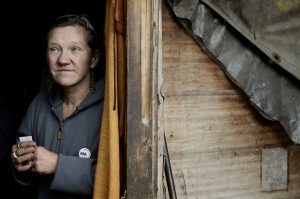 Our goal is to implement the Housing First method in Hungary to the greatest extent we can: we help rough sleepers move into affordable rental housing, and provide the support they need to maintain it in the long run. But more broadly we also advocate that affordable rental housing provision become the institutional, national policy level solution to homelessness in Hungary, and we also provide support to people affected by other forms of housing poverty and exclusion.
Our goal is to implement the Housing First method in Hungary to the greatest extent we can: we help rough sleepers move into affordable rental housing, and provide the support they need to maintain it in the long run. But more broadly we also advocate that affordable rental housing provision become the institutional, national policy level solution to homelessness in Hungary, and we also provide support to people affected by other forms of housing poverty and exclusion.
National homelessness provision efforts in Hungary have been limited to providing mass shelters, despite long term criticism from providers and policy professionals. At the same time, homelessness has not only been criminalised, but its criminalization has been enshrined in the country’s Constitution.
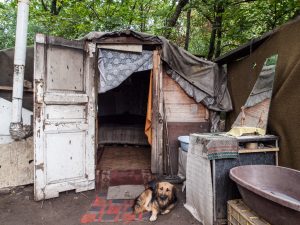
We promote our policy goal by introducing and upscaling humane and efficient good practices, and campaign for their policy level adoption by the public sector. We promote new, cooperation-based social work methods. Our main activity is based on an innovative idea: we renovate vacant, run-down municipal apartments with the help of volunteers, and with the participation of the homeless families who will then move into the apartments. Besides, we have also set up a housing management agency, which mobilises privately owned vacant housing for affordable housing provision. We actively support the adoption of the Housing First method in Hungary, and its application within social policy. Recently we have been supporting refugees from Ukraine to access safe, affordable housing. We have also been piloting a project to help union members (social workers and nursery staff) find affordable rentals near their workplace. Our entire work is open and transparent, and our related continuous communication campaign aims at raising awareness about homelessness and the housing crisis, and calling attention to the individual and social consequences of housing problems.
Hungary’s current homeless provision system, based nearly entirely on underfunded shelters and riddled with criminalization and a discriminatory public discourse, is unable to provide a realistic and sustainable way out of homelessness, and is especially inadequate for rough sleepers living in self-built huts. For these people, institutional care often means a step backwards: they are expected to give up their household and privacy, would not be able to keep most of their belongings, couples cannot stay together etc. Housing First offers individual housing, and provides a real possibility of social integration for roughly the same cost. We believe that housing must be the first step of social reintegration, not its end goal.
Housing programmes: ‘From Huts to Homes’, ‘Housing Now!’, and Solidarity Housing for Refugees
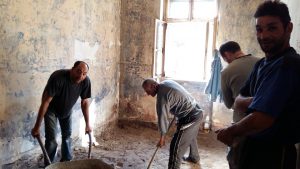 Since starting our work in 2012 we have been helping homeless persons move into renovated municipal flats. We renovate vacant, run-down municipal dwellings with the help of volunteers the future tenants – hut-dwelling rough sleepers – in cooperation with district municipalities, in partnership with other civil society organisations, and with the help of individual and organisational donations. Our clients have no chance of accessing long term, safe and affordable housing otherwise, as according to the vast majority of municipal decrees, homeless persons are not eligible for municipal rental housing. At the same time, municipalities often have poor quality housing stock with many dilapidated, even uninhabitable flats, and limited resources for housing renovation.
Since starting our work in 2012 we have been helping homeless persons move into renovated municipal flats. We renovate vacant, run-down municipal dwellings with the help of volunteers the future tenants – hut-dwelling rough sleepers – in cooperation with district municipalities, in partnership with other civil society organisations, and with the help of individual and organisational donations. Our clients have no chance of accessing long term, safe and affordable housing otherwise, as according to the vast majority of municipal decrees, homeless persons are not eligible for municipal rental housing. At the same time, municipalities often have poor quality housing stock with many dilapidated, even uninhabitable flats, and limited resources for housing renovation.
Through our ‘From Huts to Homes’ programme the tenants can exit homelessness. Before, during and after moving in, we provide intensive social work, in line with the Housing First approach. It is a fundamental part of our work, in which housing security is considered the first step in social reintegration. The goal is to help clients retain their housing in the long run, for which we identify employment opportunities, and/or social transfers when appropriate. Some of our clients had no regular income whatsoever upon moving into their new housing, and today they are able to pay their bills regularly and on time.
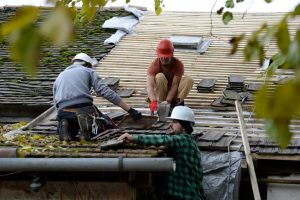 In 2015 we launched the ‘Housing Now!’ Social Housing Agency, to demonstrate that privately owned housing can also be used to alleviate the housing crisis. We rent privately owned housing on the market, from private individual owners, and take over the management of the dwelling: we select tenants and provide their social accompaniment, guarantee upkeep and maintenance of the home, regular rent payment, and the prevention of utility arrears. The cost of the service package we provide is deduced from the rent. Many owners are willing to accept a reduced rent even compared to this; in this case we can sublet the dwelling to a vulnerable client exiting from homelessness. If the owner chooses not to give further discount, we sublet the home to a member of our partner, the Union of Social Workers. Members of this organisation are key workers with low incomes, and are also in need of housing that is more affordable than market rent levels.
In 2015 we launched the ‘Housing Now!’ Social Housing Agency, to demonstrate that privately owned housing can also be used to alleviate the housing crisis. We rent privately owned housing on the market, from private individual owners, and take over the management of the dwelling: we select tenants and provide their social accompaniment, guarantee upkeep and maintenance of the home, regular rent payment, and the prevention of utility arrears. The cost of the service package we provide is deduced from the rent. Many owners are willing to accept a reduced rent even compared to this; in this case we can sublet the dwelling to a vulnerable client exiting from homelessness. If the owner chooses not to give further discount, we sublet the home to a member of our partner, the Union of Social Workers. Members of this organisation are key workers with low incomes, and are also in need of housing that is more affordable than market rent levels.
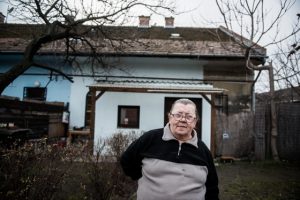 As house prices rose significantly in 2016, we launched our mobile home investment programme, in which we install up to two Scandinavian style second-hand mobile homes on plots either purchased or granted right of use, which is significantly less expensive than standard housing, while providing the same level of comfort. On the other hand, the investment programme also allows for the simpler involvement of support, which facilitates the expansion of the ‘Housing Now!’ programme. Supporters will be able to invest in a socially sensitive manner, with a return on investment over time. Two mobile homes were installed in 2018; and two more await future installation.
As house prices rose significantly in 2016, we launched our mobile home investment programme, in which we install up to two Scandinavian style second-hand mobile homes on plots either purchased or granted right of use, which is significantly less expensive than standard housing, while providing the same level of comfort. On the other hand, the investment programme also allows for the simpler involvement of support, which facilitates the expansion of the ‘Housing Now!’ programme. Supporters will be able to invest in a socially sensitive manner, with a return on investment over time. Two mobile homes were installed in 2018; and two more await future installation.
In early 2022, Russia invaded Ukraine, a country which neighbours Hungary, and war refugees began to arrive in the country. Their housing and support was largely left to civil society and church organisations. We launched the ‘Solidarity Housing’ project, in which we circulate our request among property owners for low rent dwellings, specifically for refugee families from Ukraine. In March 2023, about one year after the start of this project we were in contact with nearly 100 households who found a safe rental; although some clients moved on after a shorter stay. Many of our clients speak English with their social workers; and one of our staff members is a Ukrainian speaker. We plan to continue this activity in the long run, and already opened the opportunity for refugees from other countries in 2023.
Support groups: Give Work!, peer mentoring, and women’s club
Persons exiting homelessness are often isolated, carry trauma, and lack a personal support network. Our case management is based on partnership, sustainable housing through helping our clients secure stable income, and providing our clients with various forms of support, including peer groups, to help them integrate into their local and peer community.
In the ‘Give Work!’ group clients discuss their job market experience as homeless or formerly homeless persons. Persons living in poverty often undertake temporary work, often informally. This leaves them in a vulnerable position: they aren’t always given their promised pay, they have neither social security coverage nor pension funds etc. ‘Give Work! was our first peer support group, launched in 2016 to respond to these challenges. We provide an online and an offline interface and organise regular group meetings to our housed clients and other persons living in homelessness or housing poverty. Our goal is to support their long term insertion into the formal labour market; and to help them find formal, registered work, gain provable work experience, and eventually – ideally – land a stable job. Our social workers and peer group members support clients and one another in identifying job and vocational training opportunities. We also inform potential employers about the services offered by clients, and provide quality guarantee on behalf of our association.
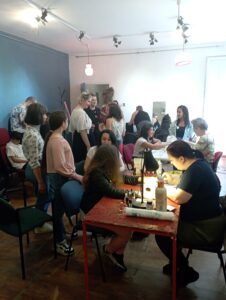 Our social workers have felt for long that many of our clients feel lonely and isolated, and we occasionally organised community events in the past to help them build connections and overcome their isolation. We had to suspend these due to the pandemic in 2020 and most of 2021, but relaunched and revamped them in 2022. We have long been planning to start a women’s club, where our women tenants can socialise and spend time in a safe space. We first surveyed our clients’ interests, to find the shared themes and interests around which we could organise meetings and events. Our first meeting was a “women’s day” event in summer 2022, to which we also invited hairdressers and manicurists. We have been organising club meetings every three weeks, with different themes and activities, like community cooking or arts and crafts, while we also discuss women’s issues and problems, and share experiences in a safe environment. It also gives our tenants the opportunity to be part of a community and establish friendships.
Our social workers have felt for long that many of our clients feel lonely and isolated, and we occasionally organised community events in the past to help them build connections and overcome their isolation. We had to suspend these due to the pandemic in 2020 and most of 2021, but relaunched and revamped them in 2022. We have long been planning to start a women’s club, where our women tenants can socialise and spend time in a safe space. We first surveyed our clients’ interests, to find the shared themes and interests around which we could organise meetings and events. Our first meeting was a “women’s day” event in summer 2022, to which we also invited hairdressers and manicurists. We have been organising club meetings every three weeks, with different themes and activities, like community cooking or arts and crafts, while we also discuss women’s issues and problems, and share experiences in a safe environment. It also gives our tenants the opportunity to be part of a community and establish friendships.
For the same reason, we started a peer support group as well, in which tenants who have been with us for longer period also support newcomer tenants, along with the social workers. In contrast to the social workers, they provide true peer support – they define their role as “experts by experience”. We have 6 mentors, who support 10-12 new tenant families. Three of the peer helpers are Hungarian speaking refugees from Ukraine, who help other refugee families navigate Hungary’s public administration and support systems, and everyday life in Budapest. The other peer helpers are formerly homeless people who have been our tenants for a prolonged period, and also have experience in activism and social rights advocacy. The share experience, give advice, and support families who exited homelessness more recently, and are still dealing with the emotional weight of the radical change in their living conditions (even though exiting homelessness is a joyful event, the sharp change is still stressful; clients need to get used to their new living conditions and routines). The peer groups share experience, and support each other in the fields of everyday life, housing related issues, employment, but also do leisure activities together. When the peer mentors gain a deeper understanding of a family’s needs, they can also arrange specific support for them. Although all of our tenants are supported by a case worker, we find that the added support of a peer who lived similar experiences is very valuable for our clients’ self-esteem and sense of community.
Volunteers
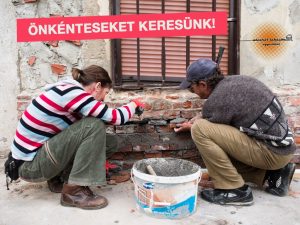 It is no accident this photo was chosen for a poster calling for volunteers: it perfectly shows the importance of volunteering in our work. Our volunteers come from very diverse backgrounds, and have very diverse experiences. In the picture, a homeless member of the activist group City is for All is teaching the basics of masonry to a volunteer, coming from a much more privileged background. This situation is not infrequent, and working with homeless persons does not only change the life of our clients, but also the perception and attitudes of our volunteers. The involvement of prospective tenants in renovation works serves changing social perception and prejudices against the homeless, as well as helping them gain skills and possibly work experience, and perhaps building a supporting network during the renovation works.
It is no accident this photo was chosen for a poster calling for volunteers: it perfectly shows the importance of volunteering in our work. Our volunteers come from very diverse backgrounds, and have very diverse experiences. In the picture, a homeless member of the activist group City is for All is teaching the basics of masonry to a volunteer, coming from a much more privileged background. This situation is not infrequent, and working with homeless persons does not only change the life of our clients, but also the perception and attitudes of our volunteers. The involvement of prospective tenants in renovation works serves changing social perception and prejudices against the homeless, as well as helping them gain skills and possibly work experience, and perhaps building a supporting network during the renovation works.
Results and publicity
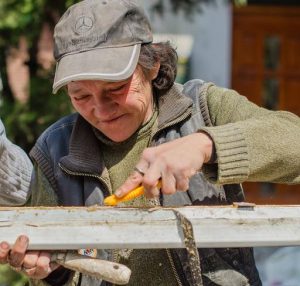 Our Housing First programme is successful: the life quality of our housed clients is significantly improved, and they are becoming independent and self-reliant in their changed circumstances. The number of our tenants surpassed 100 in 2022, and in early 2023 we also supported the housing of about 100 refugee families. But the aim of our work is not merely social provision: we intend to widely and continuously publicise our activities in the traditional and social media, and advocate overarching reform in homeless provision, and housing poverty measures in general.
Our Housing First programme is successful: the life quality of our housed clients is significantly improved, and they are becoming independent and self-reliant in their changed circumstances. The number of our tenants surpassed 100 in 2022, and in early 2023 we also supported the housing of about 100 refugee families. But the aim of our work is not merely social provision: we intend to widely and continuously publicise our activities in the traditional and social media, and advocate overarching reform in homeless provision, and housing poverty measures in general.
We believe that this is strongly supported by the fact that our clients are given room to express their own experience, showing their own effort in solving their situation, and thus demonstrating that homelessness and housing poverty are systemic problems, which nonetheless have a human face: that of our clients’.
An informative article about our HomeLab project can be read here.
About Hungary: Finding a solution to Budapest homeless community
Eurozine: Criminalization of homelessness
Precarious Housing in Europe: A Critical Guide (about the organization from the 333 page)
Besides our media coverage, our work is presented in our introductory video:
You can visit our facebook page at www.facebook.com/utcarollakasba (in Hungarian).
If you have any questions about our program please contact us at info@utcarollakasba.hu
